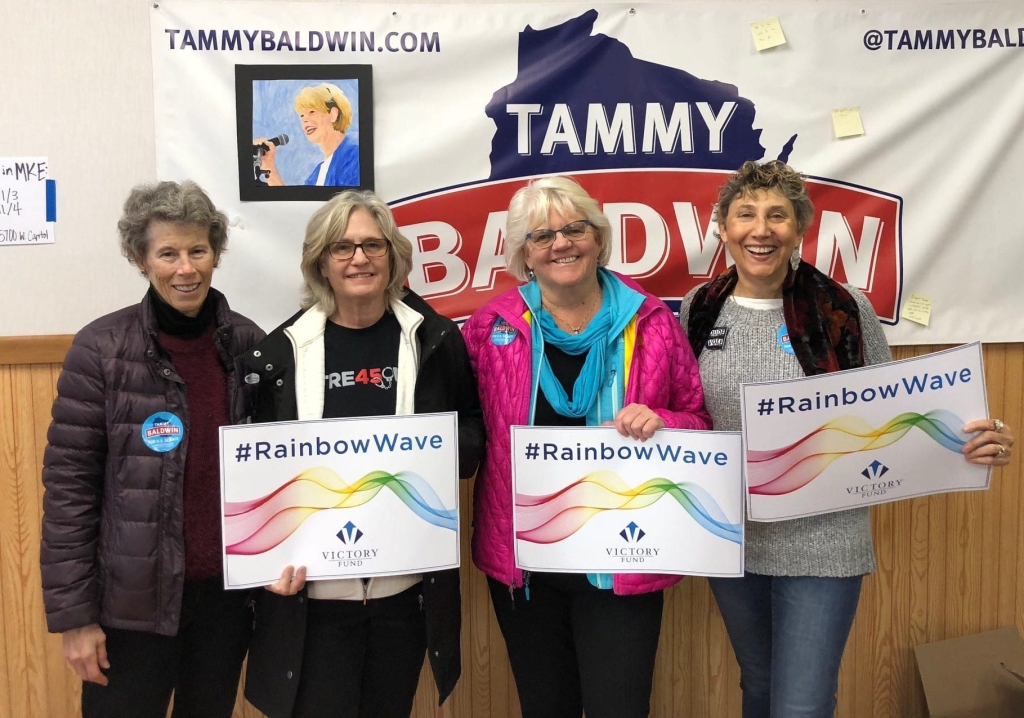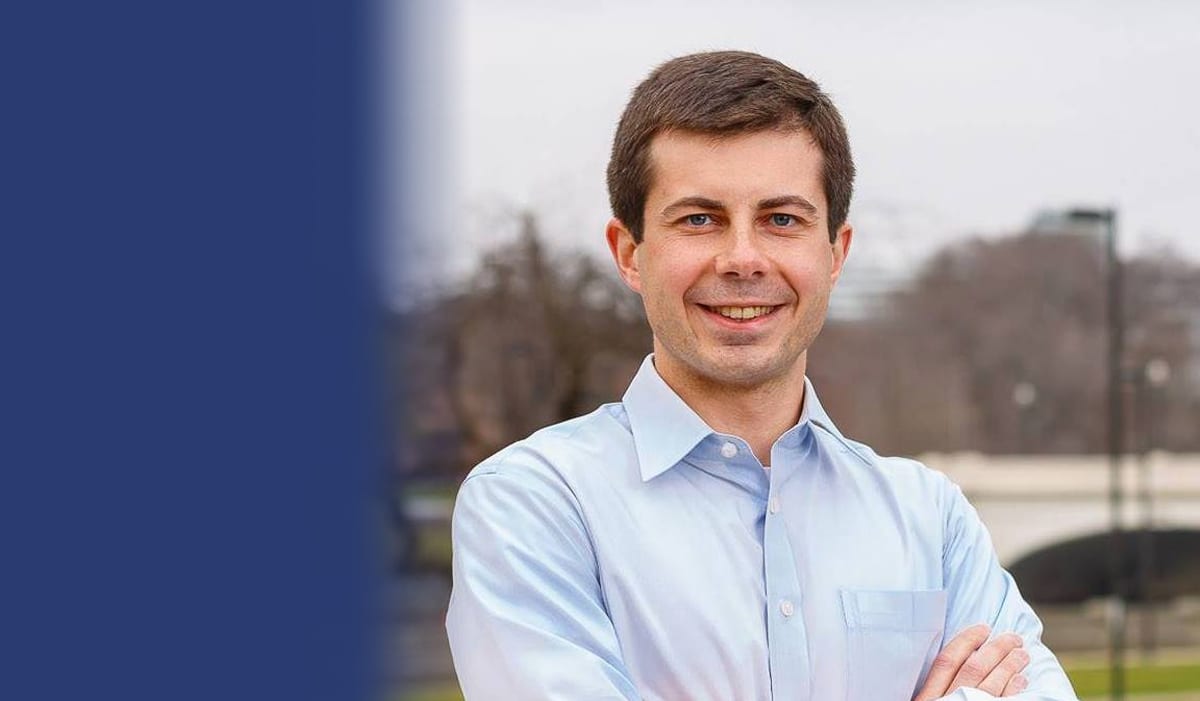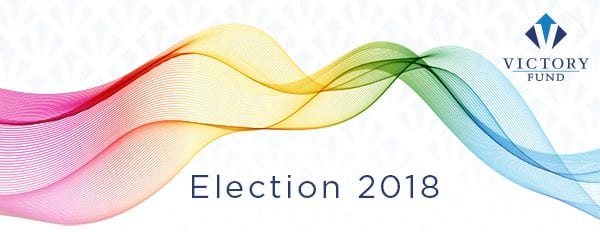
Election night 2018 resulted in a true Rainbow Wave sweeping the nation. LGBTQ candidates won in several key states where representation was restored – or history was made. Indiana, Kansas and Nebraska elected LGBTQ legislators for the first time, while trans representation was tripled (some races still pending).
All four Victory Fund endorsed incumbents running at the Congressional level were reelected: Congressman Mark Takano in California, Congressman Mark Pocan in Wisconsin, Congressman David Cicilline in Rhode Island and Congressman Sean Patrick Maloney in New York. Senator Tammy Baldwin – currently our only LGBTQ Senator – won her reelection campaign against McConnell-backed challenger Leah Vukmir. Despite an unprecedented amount of spending against Senator Baldwin, she claimed victory with a comfortable 10-point margin. Congresswoman Kyrsten Sinema, an openly bisexual woman running for U.S. Senate in Arizona, is too close to call as of writing. If she wins, she will bring the total number of LGBTQ leaders in the U.S. Senate to two.
Thus far, we have elected four openly LGBTQ non-incumbents to the U.S. House, bringing the total in the House next year to eight (two more than currently). They are Angie Craig (MN), Chris Pappas (NH) Sharice Davids (KS) and Katie Hill (CA). Craig defeated vigorously anti-LGBTQ and anti-woman incumbent Jason Lewis, who failed to shake numerous racist, sexist and homophobic quotes from a past career as a shock jock. Meanwhile, Davids makes history as the first openly LGBTQ member of Congress from Kansas and the first Native American woman elected anywhere. Additionally, there is one LGBTQ candidate in a U.S. House race is heading to a recount: Gina Ortiz Jones (TX).
But LGBTQ state legislative candidates have truly led the Rainbow Wave this cycle. Numerous LGBTQ historic first were achieved on Election Night 2018. 84 openly LGBTQ Victory Fund endorsed candidates won seats across 36 states as of November 7th in the evening, including in three states that have never elected openly LGBTQ state legislators before. Only seven states had never elected an openly LGBTQ person to their state legislature, but that number is now four after LGBTQ candidates won in Indiana, Kansas and Nebraska.
Here are the highlights of the historic rainbow wave that swept through state legislatures:
Only Four Remaining States Never Elected an Openly LGBTQ State Legislator
Three of the seven states that never elected an openly state legislator did so on Election Day: Indiana, Kansas and Nebraska. Now only Alaska, Louisiana, Mississippi and Tennessee have never elected an openly LGBTQ state legislator (state legislative elections were not held in Louisiana or Mississippi this year).
- In Kansas, voters elected two openly LGBTQ state legislative candidates: Susan Ruiz and Brandon Woodard; and
- JD Ford was elected to the Indiana state Senate and Megan Hunt to the Nebraska House of Representatives.
Trans Representation Tripled in State Legislatures
Two openly trans people were elected to the New Hampshire state legislature and results are not final for two additional trans state legislative candidates in Colorado and Montana. With the New Hampshire wins, only three out trans state legislators have ever been elected in the United States (Virginia Delegate Danica Roem, currently serving, was the first out trans person to win and serve in a state legislature last year).
- Gerri Cannon and Lisa Bunker won seats in the New Hampshire House of Representatives; and
- Results are not in yet for Amelia Marquez running for the Montana House of Representatives andBrianna Titone running for the Colorado House of Representatives.
LGBTQ Representation Restored to Two State Legislatures; Saved in Two Others
There were no openly LGBTQ state legislators in thirteen states before Election Day, although six of those states previously had openly LGBTQ state legislators. Of those six, openly LGBTQ people won state legislative seats and restored representation in two of them: Arkansas and West Virginia. No out-LGBTQ candidates won in the other four states: Delaware, Hawaii, Kentucky and South Dakota.
- Cody Thompson won a seat in the West Virginia House of Delegates and Tippi McCullough to the Arkansas House of Representatives.
Additionally, LGBTQ representation was saved in two states with retiring LGBTQ state legislators by electing other openly LGBTQ state legislators on Election Night: Alabama and Utah.
- Neil Rafferty won in Alabama and became the first openly gay man elected to the Alabama state legislature and Derek Kitchen won a seat in the Utah state Senate.
Historic Firsts for Diverse Candidates in State Legislatures Throughout the Nation
Beyond the above candidates, LGBTQ people shattered lavender ceilings in state legislative races across the country, becoming historic firsts in their states. The victorious candidates were the most diverse slate of LGBTQ state legislative candidates in history.
- Gabriel Acevero is the first openly gay man of Afro-Latino descent elected to the Maryland General Assembly;
- Nickie Antonio is the first openly LGBTQ person elected to the Ohio state Senate;
- Sonya Jaquez Lewis is the first openly LGBTQ Latina elected to the Colorado state legislature (Rochelle Galindo can join her in that distinction but her race is currently too close to call);
- Shevrin Jones is the first openly LGBTQ African American elected to the Florida state legislature (he previously served three terms but came out earlier this year);
- Malcolm Kenyatta is the first openly LGBTQ person of color elected to the Pennsylvania state legislature;
- Jeremy Moss is the first LGBTQ person elected to the Michigan state Senate;
- Lamont Robinson is the first LGBTQ person of color elected to the Illinois General Assembly;
- Mary Washington is the first openly lesbian woman elected to the Maryland state Senate; and
- Jennifer Webb is the first LGBTQ woman elected to the Florida state legislature.
Further proof of the Rainbow Wave? David “Hutch” Hutchinson made history and news with his election, becoming the first openly LGBTQ Sheriff in the Midwest. Hutch defeated three-term incumbent Sheriff Rich Stanek in Minnesota.
Of the 225 Victory Fund endorsed LGBTQ candidates on the ballot on Election Day, 153 have won their races so far with many still undecided, as of November 7th in the evening.
For the latest results, visitvictoryfund.org/results2018.

